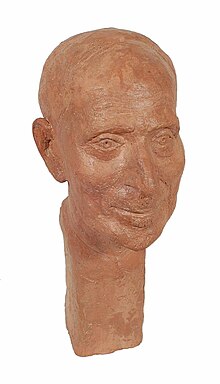Albert Funk (pharmacist)

Albert Josef Funk (born May 7, 1887 in Herrischried ; † November 25, 1979 in Singen ) was a German pharmacist , prehistoric scientist and local researcher .
Life
Albert Funk has made a name for himself as a prehistorian and local researcher. Archeology , palaeontology , mineralogy , botany , entomology , nature conservation , customs , folklore , field names , patronage and early establishment of localities found his interest.
Funk came to Herrischried in the Black Forest as the son of gendarme Johannes Funk and his wife Philipine Funk nee. Stiegeler to the world. After attending the humanistic grammar school in Donaueschingen, he studied pharmacy in Freiburg im Breisgau . After the state examination, Albert Funk worked from 1911 to 1914 at the medical-chemical institute of the University of Freiburg as a research assistant . During his studies, Albert Funk began to collect extensive collections of minerals , fossils , plants and butterflies. Prehistoric and early historical finds, graphics and paintings were later added to the Funk collection . In 1917 he leased the pharmacy in Bad Schussenried until he opened his own pharmacy in Singen am Hohentwiel in 1923 . Since 1917 Albert Funk was born with Auguste Funk. When married. The Funk couple had a son and two daughters.
Until the mid-20th century - during the time in which the archaeological monuments of private passed into the public sector and the public monuments was in still in its infancy - led radio in singing and in Hegau a variety of excavations by, collected and documented the finds. These were essentially emergency excavations that were necessary to salvage sites that were threatened by construction work. At first it worked without a legal basis, later on the basis of the Monument Protection Act. Albert Funk willingly made his knowledge and collections available to science. In addition to scientific publications, he also addressed the general public through numerous publications in magazines and the press. In 1925 he founded the Hegau Museum with his own funds , which was taken over by the city of Singen in 1938. During the Nazi era, too, he continued to expand his private collection through acquisitions and in some cases through unclear growth. Funk was a member of several NS organizations and maintained good relations with several high NS functionaries. Today, however, it is difficult to say anything about this, as Funk's legacy from 1933 to 1945 has been verifiably cleaned up. After the war he was able to continue his work without any problems and without any significant interruptions.
From 1927 to 1933 and from 1947 to 1964 Albert Funk was the voluntary district curator for the state archaeological monument preservation . From 1929 to 1954 he was a member and district representative of the Konstanz district conservation agency. He chaired the local group singing of the Badische Heimat regional association from 1926 to 1945. In 1951 he was awarded the Federal Cross of Merit and became an honorary citizen of the city of Singen. In 1959 he became an honorary member of the Hegau History Association , and in 1961 a corresponding member of the German Archaeological Institute . In 1962 the City of Singen was awarded the Ring of Honor and in 1975 the Hegaupreis of the municipality of Steißlingen .
literature
- Herbert Berner: Award of the Hegaupreis of the community of Steißlingen to Albert Funk, Johann Stehle and Hans Wagner on March 1st, 1975. In: ZS Hegau. 32/33. 1975/1976.
- August Eckerle: Pharmacist Albert Funk. In: Archaeological News from Baden. Issue 24. Freiburg 1980.
- Herbert Berner: The pharmacist from Singen. In: Ernst Ziegler (Ed.): Pharmacies and pharmacists in the Lake Constance area. Thorbecke, Sigmaringen 1988, ISBN 3-7995-5033-X .
- Eva Herrmann, Frauke Kreienbrink and Judith Schachtmann: Report on the conference “Change in 1945? Prehistoric Archeology in its Political and Scientific Context ”from September 24 to 26, 2009 in Dresden , In: Archäologisches Nachrichtenblatt 16 (2011), p. 304
Web links
- Literature by and about Albert Funk in the catalog of the German National Library
- Archaeological Hegau Museum of the City of Singen (Hohentwiel)
| personal data | |
|---|---|
| SURNAME | Funk, Albert |
| ALTERNATIVE NAMES | Funk, Albert Josef (full name) |
| BRIEF DESCRIPTION | German pharmacist, prehistorian and local researcher |
| DATE OF BIRTH | May 7, 1887 |
| PLACE OF BIRTH | Herrischried |
| DATE OF DEATH | November 25, 1979 |
| Place of death | To sing |